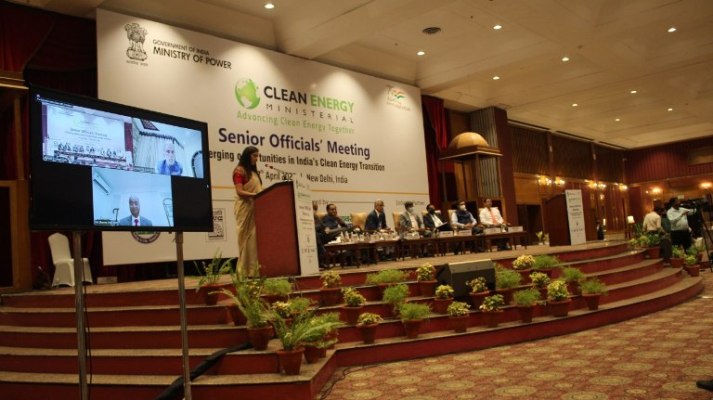Seminar on emerging opportunities in India’s Clean Energy Transition
By: Kulsoom Abid
Radiance News Service
Green energy is renewable energy and is generated from natural resources such as wind, sunlight, and water, resulting in less pollution than traditional fuel sources – some of which are significant causes of climate change and global warming. The world is evolving, growing, and progressing in multiple ways such as infrastructure, lifestyle, and many more resulting in a large amount of deforestation and exploitation of natural resources. It is well known that more than 70% to 80% of the global industry uses fossil fuel to work, which is non-renewable and contributes immensely to the degradation of the environment. According to a European Geoscience Union report, in coming years there is a huge possibility of a two per cent increase in temperature that could have disastrous consequences:
- Extreme heatwaves would affect 37%of the world's population, causing skin diseases and eye infections due to UV rays and heat.
- 98 percent of coral reefs will be destroyed, leading to degradation of the ecosystem of water bodies in the world.
- Up to 80 million people will be displaced, as many countries that lay in the equator will not be liveable.
All these researches made the world open its eyes to the deuteriation of environmental conditions.
Hence, in 2016, parties to the UNFCCC pledged to limit the rise in temperature to 1.5 degrees through the ground-breaking Paris Agreement under Clean Energy Ministerial.
A special event was organized at Convention Hall, Ashoka Hotel on April 7, 2022 by the Federation of Indian Chambers of Commerce and Industry (FICCI) and Government of India Ministry of Power regarding the emerging opportunities, upcoming challenges, and policies on India’s Clean Energy Transition. This Clean Energy Transition initiative was started in order to achieve a less-polluted and greener environment to tackle global warming and ensure the sustainability of the natural resources.
Pix: Janinjai
Transitioning to a low-carbon economy is vital to maintaining global temperatures from rising, but the key question is how to manage the economic and social costs of doing so. While India has a plethora of policies in place to ensure a secure and sustainable future, on its path to low carbon emissions, it faces the dilemma of balancing growth with sustainability, as do most developing countries. The consequences of various transition pathways must be evaluated in terms of not only technology but also social welfare, employment effects, energy security, investment requirements, and other developmental concerns. It is important to concentrate on ensuring that the energy pathway is socially inclusive, economically viable, and guarantees long-term resource sustainability.
The event was graced with the presence of the following delegates:
· Gurdeep Singh, Chairman and Managing Director, NTPC Ltd
· M Nagaraju, Additional Secretary, Ministry of Coal
· Indu Shekhar Chaturvedi, Secretary, Ministry of New and Renewable Energy
· Krishan Pal, Minister of State for Power and Heavy Industries
· Shri K Sreekant, Chairman and Managing Director, POWERGRID
· N L Sharma, Chairman and Managing Direction, Satluj Jal Vidyut Nigam Limited
· Ranjit Gupta, Chairman, FICCI Renewable Energy CEOs Council, and Managing Director & CEO, Azure Power
· Vipul Tuli, Chairman, FICCI Power Committee & CEO- South Asia, Sembcrop Industries
· Shivanand Nimbargi, Co-Chairman, FICCI Renewable Energy CEOs Council and MD & CEO, Ayana Power
· Sujoy Ghosh, Vice President & Country Managing Director- India, First Solar
· Vivek Kumar Dewangan, Additional Secretary, Ministry of Power
Everyone spoke about what to expect in the upcoming years and how efficiently we are tackling the challenges to reach the goal before our target year, that is, 2030.
Gurdeep Singh, Chairman and Managing Director, NTPC Ltd, mentioned in his speech that 50% of the energy requirements to be met in 2030 will be of renewable energy. ISA (International Solar Alliance) has taken up projects in African countries as India believes collaboration is the key. He concluded by saying, “By next year green hydrogen will be taken up in the round economy.”
M Nagaraju, Additional Secretary, Ministry of Coal, conveyed that Renewable Energy and Energy efficiency are two main aspects, whereas soft skills are also required for the industry to flourish. He ended his speech by saying “Job is what a country like India requires.”
Indu Shekhar Chaturvedi, Secretary, Ministry of New and Renewable Energy, announced that “ The solar capacity has increased 20% since 2014.” He acknowledged that “ The target to 2030 is not easy but our past experiences give us confidence.” And the fact that “recycling of solar waste will come up to be a big problem.” He shared with us that currently, the plan is to increase the demand for hydrogen as much as possible and a decentralized renewable energy project has been in motion in order to improve livelihood and could have excess to cheap energy.
As the demand will increase challenges such as black-marketing, corruption, and inflation in the prices of non-renewable energy could be highly expected. We all hope this eco-friendly initiative does not change into a dirty business or any new reason behind the suffering of marginalized sections. India is a densely populated country with a regular lack of employment opportunities, the social and economical transition needs should be understood and managed to ensure an effective framework.
There is a need for more such interactions as they helps
to reach out to the a larger audience. Not only these seminars, workshops apprise of what the government or respective deapartments are doing but also connects stakholders, media, and most important the star-up initiatives working in the respective feilds and aspire to serve better with advanced technology and expertise.


